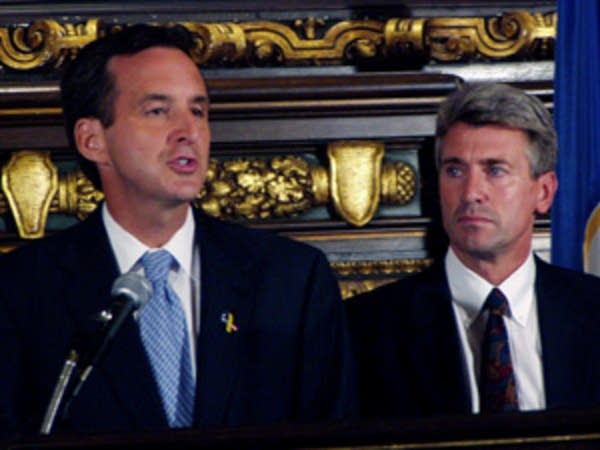Rybak, Pawlenty spar over budgets

This week's release of a city budget proposal in Minneapolis has touched off another round of public sparring between Mayor R.T. Rybak and Gov. Tim Pawlenty.
The long-time political adversaries have frequently feuded over state and city funding issues. Their political acrimony intensified this week during separate radio broadcasts.
When Rybak presented his annual budget address Thursday, he described how his city was an example of fiscal responsibility at a time when state government is in a financial meltdown.
He also said he needed to set the record straight and respond to people at the State Capitol who've criticized the spending decisions of Minneapolis.
Create a More Connected Minnesota
MPR News is your trusted resource for the news you need. With your support, MPR News brings accessible, courageous journalism and authentic conversation to everyone - free of paywalls and barriers. Your gift makes a difference.
"If you look at city spending compared to state spending since the year 2003, city spending during that time has increased 1 percent.," Rybak said. "State spending during that time has increased 12 percent. I do not believe the city of Minneapolis needs a lecture from those at the State Capitol who have pushed this state into financial chaos."
The Democratic mayor didn't mention Pawlenty by name, but he didn't have to. The Republican governor has been a frequent critic of Minneapolis, especially when defending his cuts in state aid to cities.
The day after the mayor's Thursday speech, Pawlenty was at it again. During his weekly radio show, Pawlenty read a list of big public projects in Minneapolis that he said couldn't have happened without the state. The list included the new Guthrie Theater, light rail and commuter rail lines, the new Twins stadium and several facilities at the University of Minnesota.
"Basically every project of significance or iconic nature is courtesy in whole or in part of the state," the governor said. "And of course then the mayor has his state of the city address and the thanks we get is to get kicked in the shins."
Pawlenty made light of the city's solo economic development efforts by pointing to Block E, a downtown retail and entertainment complex that's lost many of its major tenants. The governor also took issue with Rybak claiming to be a model for fiscal responsibility when city property taxes keep going up.
"It's a city that has increased its city levy 100 percent since 2000," Pawlenty said. "And the mayor steps out and says this is the model for financial management for the rest of us."
Pawlenty isn't running for a third-term next year, but he's mentioned as a possible GOP presidential candidate in 2012.
Rybak is running for re-election this fall, and he's also said he's interested in running to replace Pawlenty as governor. Rybak confirmed again that he's likely candidate during an interview on MPR's Midday program. He also fired back at Pawlenty.
"This brainpower state needs to fix its schools, it needs to focus on jobs, and we need to have a leader who isn't just running around giving -- you know he's out in California giving advice on budgets," Rybak said. "I guess that's the only place where he could be giving advice on budgets, because he should come back here and sit down and we should rationally discuss how to get this state moving again. I'm very proud of the record of Minneapolis."
Rybak was joined on Midday by St. Paul Mayor Chris Coleman, who has also criticized Pawlenty over state budget cuts.
Still, Coleman's budget address earlier this week did not point fingers at the governor, and the St. Paul mayor escaped Pawlenty's wrath during the governor's radio show.
Coleman, who's also considering a DFL run for governor next year, says he'd rather see state and city leaders involved in constructive conversations, rather than blaming each other for their problems.
